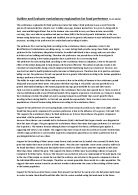Despite this research, it has been suggested that humans may have been vegetarian in the EEA, as it’s believed humans tried to be as healthy as possible by eating mainly vegetables, arguing that most of their needed calories were consumed from other sources than just animal fats. This suggests that there may not have been an overwhelming meat preference in the EEA, however this research is backed up by very little evidence, so the research is somewhat unreliable. Additionally, evidence does not support these findings as the fossil evidence and anthropological evidence from Abrams showed that all societies in the EEA displayed a preference for animal foods and fats, as cross-culture research shows a modern universal meat preference.
There is evidence of how our eating behavior shaped our food aversions and food preferences was learnt in the EEA. Evidence has shown that we avoid foods, which are poisonous to us, and we link the smell of “off” foods to illness, and consequently taste aversion. These aversions would have helped our ancestors to survive, as once we learn these foods are bad, we are unlikely to consume then further. There is also evidence that animals can learn a preference that makes them healthier, with any food eaten just before recovery from illness is then preferred in the future. This is called the ‘medicine effect’ as humans learnt to associate certain foods with feeling better i.e. Curing illness.
Animal research supports taste aversions, as rats that were given saccharin and exposed to radiation, which made them feel ill, then associated the saccharin with illness, refusing to eat it again. This supports claims that we stop eating things, which aren’t beneficial to our survival. Again, it is difficult to use evidence from animal studies to explain human behavior as previously mentioned. As well as this, research such as this on animals is extremely unethical, as it causes harm to the rats. Additionally, this research could be explained from a Behaviorist viewpoint, as it could be suggested the rats learnt to avoid the saccharin thought classical conditioning (they were being ‘punished’ for consuming it), however the evolutionary approach could work in conjunction with a behaviorist approach, to suggest many human aversions to food.
However, an issue with evolutionary explanations is that the theory is post hoc, which means we cannot be sure our assumptions of why we act are true, as we cannot study exact human behavior in the EEA. This means that research into the topic is difficult to falsify, which according to Popper, means it lacks validity, as well as scientific credibility.
A debate which arises within this theory is to whether or not food preference is down to evolution or is down to learn behavior. It is reductionist to assume that all our food preferences and aversions come directly from the EEA, as human food preferences in the modern world are very diverse. This suggests that, as mentioned before, food preferences and aversions may be learnt rather than evolved. This can also be supported as evidence suggests that a higher cholesterol was favored in the EEA to help brain function, however we now avoid cholesterol, because of some of the negative repercussions. This suggests that although nature may have had a significant effect on our consumption of high cholesterol foods, our nurture has taught us to avoid this instead, again suggesting that some food aversions are learnt rather than evolved.
AO1
AO2/3
AO2/3 IDA
On balance, it is difficult to establish whether our food preference has an evolutionary basis or not. It is clear that some food preferences may have obviously been beneficial for ancestral survival, but then again, some food preferences may be learnt in the modern world instead. It is therefore necessary to take a holistic view of food preferences, suggesting that a culmination of evolutionary and social-psychological factors shape our eating behavior.








